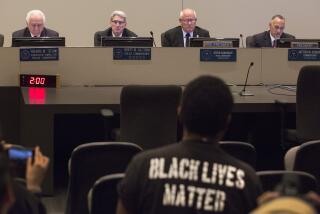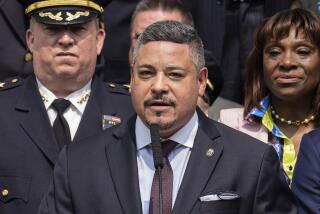Police Panel Has Kept Low Profile
In the nearly two weeks since an LAPD officer was seen on live television beating a car-theft suspect, there have been promises and apologies, panels appointed and protests organized. But one voice has been largely absent: the Police Commission, the civilian agency charged with overseeing the Los Angeles Police Department.
The panel, whose five members are appointed by the mayor to review almost every aspect of the department, has not met since Officer John Hatfield was shown hitting Stanley Miller 11 times with a flashlight on June 23.
Within hours of the beating, commission President David Cunningham III said he was “deeply disturbed” by the incident. But a few days later, Cunningham was in Hawaii on a trip, and Commissioner Rick Caruso was still on a monthlong vacation to Europe.
Mayor James K. Hahn, meanwhile, appointed a citizens committee to review the beating investigation -- confusing some at City Hall who thought that was the Police Commission’s role.
Police Chief William J. Bratton provided lengthy presentations on the investigation last week to both the City Council and the new citizens panel. But he won’t be able to address the commission until July 13, its next scheduled meeting. Cunningham also plans to hold a special community meeting focusing solely on the June incident sometime after mid-July.
Once envisioned as the key to reform in the wake of the 1991 Rodney G. King beating, the panel has seen its profile diminish in the eyes of some after it moved in 2002 to replace Chief Bernard C. Parks with Bratton.
“Under the city charter, the Police Commission is responsible for managing the department, and I think it’s troubling in the face of what’s happened that the Police Commission seems to be invisible,” said USC law professor Erwin Chemerinsky, who served on a city panel probing the Rampart corruption scandal of the late 1990s.
Richard E. Drooyan, a former federal prosecutor who helped examine both the King beating and the Rampart scandal, said the commission’s response raises “real questions about the role of the Police Commission and its effectiveness in monitoring the activities of the department.”
Both Drooyan and Chemerinsky said Hahn’s decision to appoint the citizens panel to examine the beating undermines the Police Commission.
“The impression is created that they have taken a back seat, that they are not serving as the eyes and ears of the community or functioning in an oversight capacity,” Drooyan said of the police commissioners. “The fact that the mayor and others have appointed these special commissioners suggests that the commission is not able to play that role.”
But Cunningham and others defended the commission’s measured response.
“This is not something we’re ignoring,” Cunningham said. “Quite frankly it is better to get on with the investigation process. We need to let the administrative investigation go forward. We will be part of the deliberative process.”
The Police Commission gained stature after the beating of King by a group of LAPD officers. The Christopher Commission, formed to study the department after the incident, called for the creation of an inspector general reporting to the commission to probe allegations of officer wrongdoing. It also called for the commission to take a bigger role in setting policies and overseeing the chief of police.
The inspector general is overseeing the Police Department’s investigation of the June incident.
Once the department completes that probe, the commission will determine whether the officer’s actions complied with department policy. Then, a board of rights will determine whether the officer should be disciplined, and the district attorney could file criminal charges.
The commission ultimately will not sit in judgment of the officer, but it will be responsible for any changes in policy based on the beating. Already, Bratton has called for new rules involving officers’ use of flashlights.
Cunningham said the commission did not meet June 29 because it lacked a quorum and didn’t meet this week because meetings are not scheduled after long holiday weekends. Even so, he and Vice President Alan J. Skobin met Tuesday morning with the commission staff to discuss the beating.
Cunningham said he doesn’t consider the community panel formed by Hahn to monitor the beating investigation as competition.
“Everyone was entitled to express their own opinions on the case,” he said. “Ultimately, the Police Commission will make the decisions here.”
Commissioner Rose Ochi said it would be wrong to perceive the lack of a formal meeting as inaction.
“We have been very involved and visible, although not in the sense of a regularly scheduled meeting,” said Ochi, a former top Justice Department official. “There have been a lot of gatherings and meetings separate from the official agenda.”
Others agreed that police commissioners were correct to keep a low profile.
“The commission and other bodies have to be very careful about the kinds of hearings and parallel investigations they hold because they jeopardize the integrity and the viability of the administrative and criminal investigations,” said Connie Rice, a civil rights attorney heading a commission examining the Police Department’s handling of the Rampart corruption scandal.
In the last decade, the Police Commission has faced several seminal decisions. It voted not to renew the contracts of the last two police chiefs -- Parks and Willie Williams. It also agreed to a variety of new policies ordered by the federal Justice Department as part of a consent decree signed after the Rampart scandal, in which officers said they planted evidence and framed suspects.
But some of the panel’s recent decisions have sparked internal divisions.
After heavy lobbying from the alarm industry, the commission voted last July to relax its burglar alarm response policy by voting to allow homeowners and businesses two false alarms a year before they must verify a break-in to get a police response.
Caruso cast the only dissenting vote against the policy, chiding fellow commissioners for their lack of deliberation on the plan they adopted.
“I don’t think they know what they adopted,” Caruso said at the time.
Divisions continued in May with the sudden departure of Dan Koenig, the commission’s executive director, and the almost immediate selection of Richard Tefank as his replacement. The selection of Tefank, a deputy inspector general and former Buena Park police chief, came over the vocal objections of Ochi, who contended that the panel should have conducted another national search for candidates.
Shortcomings in civilian oversight of the LAPD have been the backbone of every report on the department since the 1965 McCone Commission, which studied the agency after the Watts riots.
After the Rampart scandal, one city panel concluded that, despite 35 years of talking about a stronger police commission, City Hall still had not delivered.
The panel found that though the Police Commission has broad powers to supervise the department, it remains weak and unfocused because of its part-time status. It suggested having a full-time appointed president and vice president who are paid salaries commensurate with those of the chief of police and deputy chiefs.
Councilman Jack Weiss said the commission seems to have dropped off the radar screen in the last two weeks and has been supplanted in its role of public accountability.
“The unkindest cut of all was when Mayor Hahn appointed a shadow commission to do the actual work of the Police Commission,” he said. “The mayor marginalized his own police commission.”
More to Read
Sign up for Essential California
The most important California stories and recommendations in your inbox every morning.
You may occasionally receive promotional content from the Los Angeles Times.











